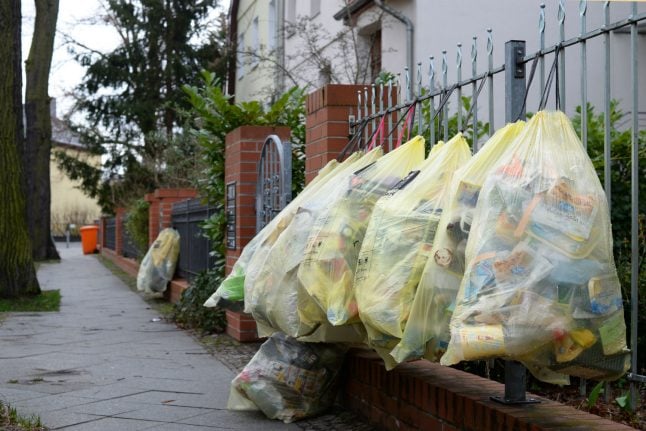The volume of packaging waste in Germany rose to a record high in 2017.
According to a new report by the Federal Environment Agency (Das Umweltbundesamt, or UBA), 18.7 million tonnes were generated that year – 226.5 kilograms per person, an increase of three percent over the previous year.
READ ALSO: Germany accumulates more packaging waste per capita than any country in the EU
Private consumers constituted 47 percent of the waste, or 107 kilograms per capita.
The UBA report, titled “The emergence and recycling of packaging in Germany” was published at the start of the “European Week for Waste Avoidance” on November 16th.

Graph prepared for The Local by Statista.
The paper cited the growing popularity of online shopping and increasingly convenient take-away dining as the main culprits behind the increase in waste.
Take-out aficionados are also more inclined to purchase small portions, leading to more packaging consumption, it added.
“We consume far too much packaging,” said UBA President Maria Krautzberger. “This is bad for the environment and for the consumption of raw materials. Waste should be avoided as early as possible in the production phase.”
“Unnecessary and unnecessarily material-intensive packaging should therefore be avoided,” she said.
Much more reusable packaging is needed, added Krautzberger, and not just for mineral water and beer.
“You can also take your coffee with you in returnable cups, and those who take their food with them should also be able to do so in returnable containers,” Krautzberger said.
Germany has already proposed several plans to cut pack on packaging waste.
In May this year, the UBA proposed surcharges of about 20 cents per take-away coffee cup and 10 cents per lid to make disposable cups more expensive than reusable alternatives.
READ ALSO: Why your takeaway coffee could soon cost more in Germany
Smaller programs have also began turning waste into fuel, at a rate of up to 250 kilograms per day. Other initiatives are aimed at improving Germany's recycling system, as reportedly up to 60 percent of plastic waste ends up in the wrong bin.
Germany still recycles a lot of waste, or just under 70 percent, the UBA stated in its report.
Steel is recycled at 92.2 percent, paper and cardboard at 87.6 percent and glass at 84.4 percent. Plastic packaging waste is recycled at 49.7 percent, and wood at 25.8 percent.
The figures for the amount of packaging waste in 2018 will not be published until next year.
READ ALSO: Germany wastes 1.7 million tons of bread per year



 Please whitelist us to continue reading.
Please whitelist us to continue reading.
Member comments